* Canadian dollar at C$1.3054, or 76.60 U.S. cents
* Bond prices slightly lower across the maturity curve
TORONTO, June 28 (Reuters) - The Canadian dollar
strengthened slightly against the greenback on Tuesday as
stabilization in global financial markets after volatility
triggered by Britain's vote to leave the European Union helped
support Canada's risk-sensitive currency.
Gains for the loonie came after it hit a three-week low on
Monday at C$1.3120 as Brexit-related shockwaves filtered through
global financial markets.
Global stocks rose as bargain hunting trumped still
widespread uncertainty over Brexit and oil prices rallied as
investors took advantage of a two-day slide. U.S. crude CLc1
prices were up 2.65 percent at $47.56 a barrel.
O/R
At 9:13 a.m. EDT (1313 GMT), the Canadian dollar CAD=D4
was trading at C$1.3054 to the greenback, or 76.60 U.S. cents,
slightly stronger than Monday's close of C$1.3073, or 76.49 U.S.
cents.
The currency's strongest level of the session was C$1.2967,
while its weakest was C$1.3086.
Canada's commodity-linked economy will suffer weaker growth
because of Britain's vote to leave the EU, which has put the
prospect of Canadian interest rate cuts back on the table.
Overnight index swaps implied a nearly one-third chance of a
Bank of Canada rate cut this year after having been priced for
no change in policy before Brexit. BOCWATCH
Canadian government bond prices were slightly lower across
the maturity curve as the rally in safe-haven assets paused.
The two-year CA2YT=RR price dipped 2 Canadian cents to
yield 0.499 percent and the benchmark 10-year CA10YT=RR fell 5
Canadian cents to yield 1.084 percent.
On Monday, the 10-year yield hit its lowest in 11 days at
1.077 percent.
Canada's gross domestic product data for April is awaited on
Thursday. Economic growth is expected to have edged up 0.1
percent following two months of declines. Even so, the gain is
unlikely to change expectations from analysts and policymakers
that second-quarter growth will be flat at best due to the
impact of massive wildfires in oil-producing Alberta. ECONCA
